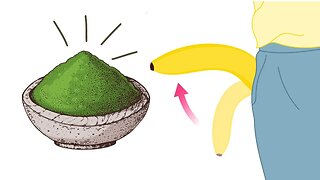Premium Only Content

Turns Out Tuna Isn't As Healthy As We Think
Americans don’t consume as much tuna as they do in other parts of the world, but generally speaking we can say that it’s still a very popular food in the United States, second only to shrimp in the seafood category. Perhaps this is because tuna is high in protein and polyunsaturated fatty acids, which are beneficial to our health. Or perhaps because it’s tasty and easy to prepare. All you have to do is open up a can of tuna and it’s ready to eat.
Whatever the reason, experts believe that tuna isn’t as healthy as we think it is.
The biggest culprit of this negativity is mercury, a toxic heavy metal that is naturally found in the air, water, and soil.
Mercury is released into the environment in a number of ways, primarily by burning coal in power plants and industrial processes, or even naturally, as in the case of volcanoes. As we are exposed to mercury, either through the air or by ingesting contaminated fish, this heavy metal tends to gather in our bodies in its organic form—methylmercury. High amounts of methylmercury can be harmful and even toxic, and can cause serious health problems.
Some of the symptoms are:
Nervousness, anxiety, irritability;
Apathy or aggression, mental confusion;
Insomnia, frequent nightmares;
Forgetfulness and memory lapses;
Headaches, migraines, muscle pain;
Dizziness, labyrinthitis;
Delirium, hallucinations, suicidal tendencies;
Weak, brittle, or soft teeth, that may fall out.
Studies point to associations between high levels of mercury and neurological problems, in addition to Alzheimer's disease, autism, anxiety, depression and Parkinson's. Almost all fish and seafood contain mercury, but larger species such as sharks, swordfish, mackerel and tuna, which are predators, tend to accumulate more of this substance. Fish like tuna, eat smaller fish, which have also absorbed mercury. That is, the more fish the tuna eats, the more mercury it absorbs.
Although there is a lot of debate on the subject, many health agencies recommend eating fish like tuna in moderation. People who are most at risk of being affected by mercury contamination are pregnant women, infants, and children.
If you like to eat seafood, it’s better to choose those with smaller amounts of mercury such as herring, cod, shrimp, lobster, oyster, salmon and sardines.
----------------------------------------
Facebook: https://bit.ly/38BWbw3
Pinterest: https://bit.ly/2Irvwa6
Disclaimer: The materials and the information contained on Natural Cures channel are provided for general and educational purposes only and do not constitute any legal, medical or other professional advice on any subject matter. These statements have not been evaluated by the FDA and are not intended to diagnose, treat or cure any disease. Always seek the advice of your physician or other qualified health provider prior to starting any new diet or treatment and with any questions you may have regarding a medical condition. If you have or suspect that you have a medical problem, promptly contact your health care provider.
-
 6:47
6:47
Natural Cures
1 year ago $1.45 earnedIf You Take Moringa Powder Every Day, This Will Happen to Your Body
5.09K3 -
 LIVE
LIVE
Price of Reason
7 hours agoBezos & Amazon FOLD After Annoying Trump! Paramount Faces TOUGH Choice! Borderlands 4 DELAYED!
10,443 watching -
 1:19:29
1:19:29
Savanah Hernandez
7 hours agoRogue Judges Continue Blocking Trump's Executive Orders: The First 100 Days
26.4K16 -
 58:42
58:42
Coin Stories with Natalie Brunell
13 hours agoMacro Analysis, Financial Fragility and Bitcoin as the End Game with Preston Pysh
6.54K3 -
 2:35:37
2:35:37
TimcastIRL
4 hours agoTrump Celebrates 100 Days Amid RECORD Lawsuits & Unconstitutional Judicial Actions | Timcast IRL
153K69 -
 1:01:26
1:01:26
Glenn Greenwald
5 hours agoRapid Fire: Canada Elections, Dem's Sit-In, Israeli Taking Points Escalate; PLUS: Jewish Academics Push-Back on Antisemitism Claims | SYSTEM UPDATE #445
100K97 -
 2:20:43
2:20:43
RiftTV/Slightly Offensive
5 hours ago $1.04 earnedTotal Indian TAKEOVER: Has The WEST Completely FALLEN? | Guest: Josh Denny
27.1K15 -
 9:46
9:46
Mrgunsngear
4 hours ago $0.52 earnedHow To Turn Your Glock Into A PCC
39.2K8 -
 16:12
16:12
T-SPLY
13 hours agoJeff Bezos Is Now Enemy #1 For The Trump Administration
96.3K76 -
 12:24
12:24
Tundra Tactical
5 hours ago $0.18 earnedThe SIG Roast to ND Them All
47.2K7